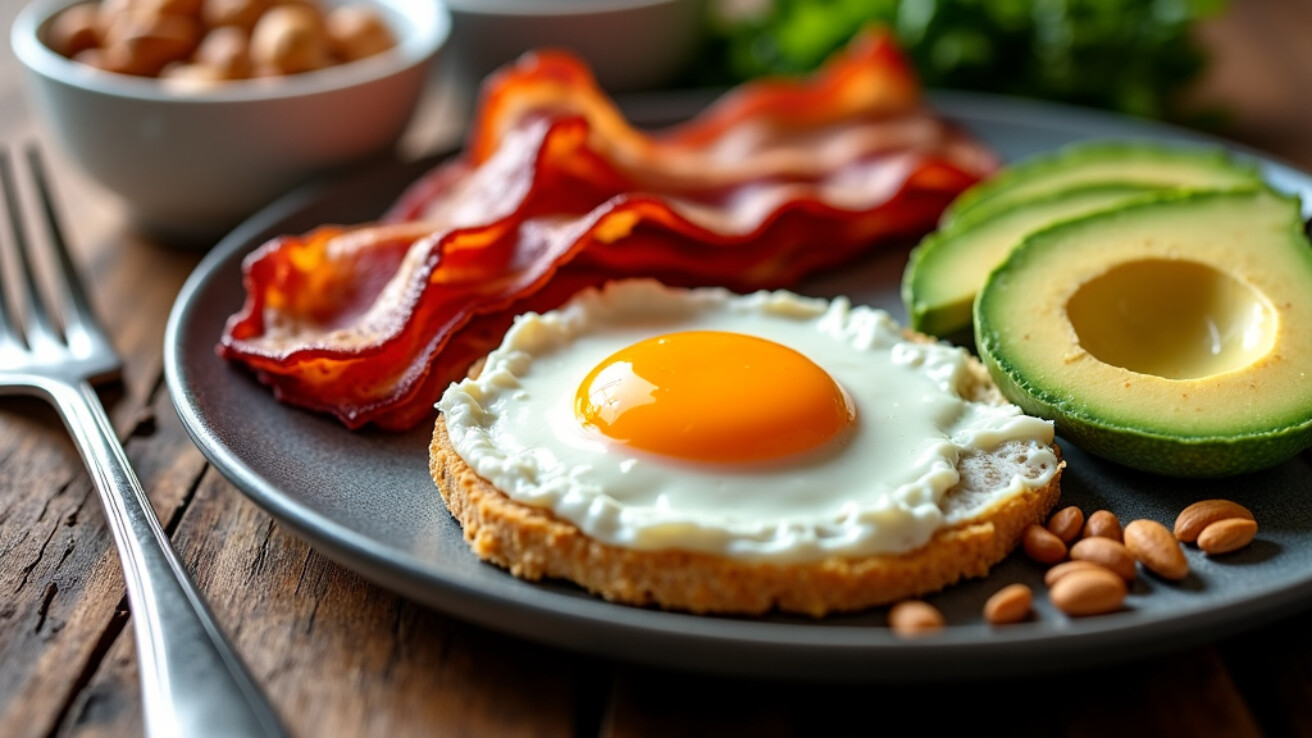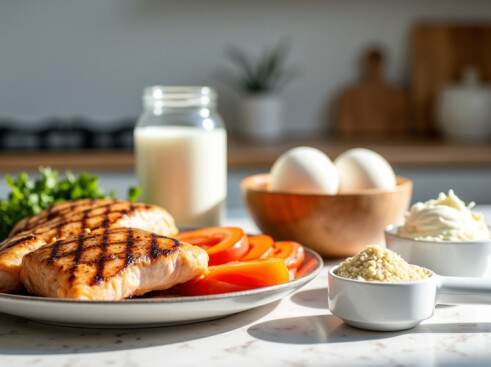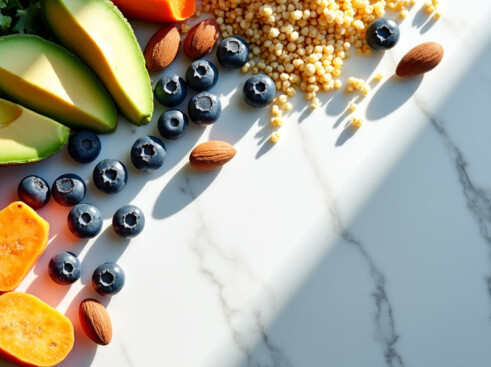Listen up, fellas – your morning meal choices can make or break your entire day. As someone who’s spent years perfecting the art of ketogenic eating, I can tell you that a well-designed keto breakfast is about strategically fueling your body for peak performance.
I’ve discovered that men have unique nutritional needs, especially when it comes to maintaining muscle mass and sustaining energy levels throughout demanding days. A protein-rich, high-fat keto breakfast serves as a powerful tool for optimizing your body’s performance.
The beauty of a well-crafted keto breakfast lies in its ability to tap into your body’s natural fat-burning potential. When you start your day with nutrient-dense foods like eggs, quality meats, and healthy fats, you’re setting yourself up for sustained energy without the mid-morning crash that typically follows high-carb breakfasts.
What fascinates me most about the ketogenic approach is how it aligns with men’s biological needs. By focusing on protein-rich morning meals, you’re providing your body with the building blocks it needs for muscle maintenance and recovery – especially crucial if you’re hitting the gym regularly.
Whether you’re a busy executive, an active athlete, or someone looking to optimize your health, I’m excited to show you how to create breakfast options that satisfy your hunger and support your fitness goals.
Understanding Keto Macros for Men’s Breakfast
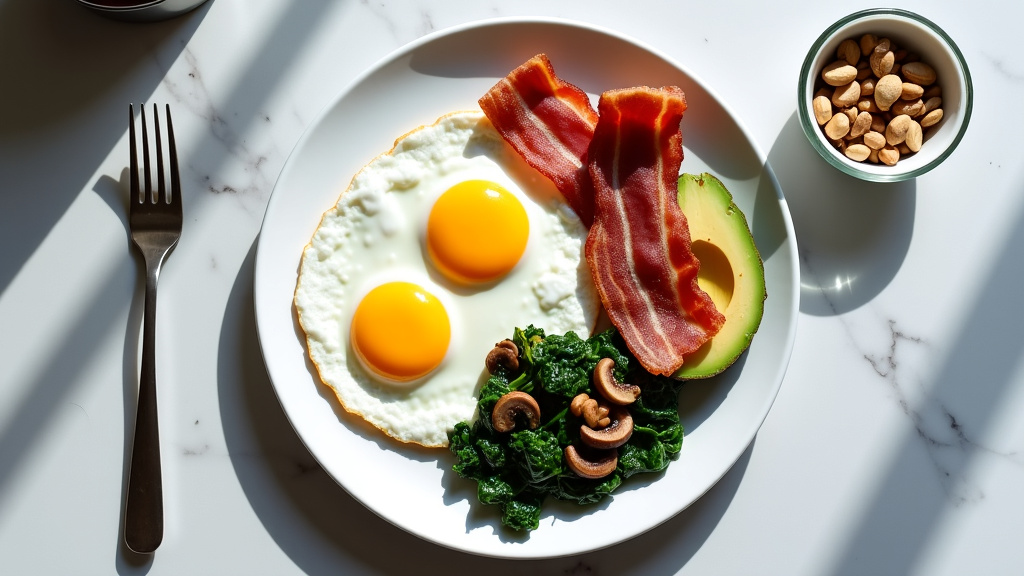
Starting your day with the right macronutrient balance can make or break your ketogenic journey. As a man following keto, hitting specific macro ratios is crucial – not just for maintaining ketosis, but for preserving muscle mass and optimizing energy levels throughout your morning.
The foundational keto macro ratio that I’ve found most effective for men’s breakfast planning breaks down to 70-75% calories from fat, 20-25% from protein, and 5-10% from carbohydrates. This distribution helps maintain steady energy while preserving ketosis.
After years of experimenting with different macro combinations, I’ve discovered that men typically need more protein at breakfast than standard keto recommendations suggest. While the baseline protein intake is 0.6-1.0 grams per pound of lean body mass, active men should aim for the higher end of this range.
Optimizing Your Morning Fat Intake
Quality fats should form the cornerstone of your keto breakfast. I recommend incorporating a mix of saturated and unsaturated fats from sources like eggs, avocados, and coconut oil to reach your 70-75% fat target.
Let’s break this down practically – if you’re eating a 600-calorie breakfast, approximately 440-450 of those calories should come from fat sources. That translates to about 45-50 grams of fat in your morning meal.
Remember, fat adaptation doesn’t happen overnight. Your body needs time to adjust to using fat as its primary fuel source, so consistency with your morning macro ratios is key.
Strategic Protein Planning
For muscle preservation and growth, men need to be particularly mindful of their morning protein intake. Your breakfast should include about 25-30% of your daily protein target.
If you’re strength training regularly, consider increasing your protein intake. In my experience working with male clients, consuming 30-35 grams of protein at breakfast helps maintain muscle mass while supporting recovery from morning workouts.
The key is finding the sweet spot – enough protein to support muscle maintenance without triggering gluconeogenesis, which could disrupt ketosis.
Managing Morning Carbohydrates
Keeping net carbs under strict control during breakfast is essential. I recommend limiting your morning carb intake to 5-7 grams of net carbs to maintain ketosis effectively.
You might be wondering, ‘What about vegetables in my breakfast?’ Focus on low-carb options like spinach, mushrooms, or asparagus. These provide essential nutrients while keeping your carb count in check.
Having coached countless men through their keto journeys, I’ve observed that those who carefully track their morning macros consistently maintain ketosis more effectively.
| Nutrient | Amount (g) | Calories | Percentage of Daily Calories |
|---|---|---|---|
| Protein | 160 | 640 | 22% |
| Carbs | 50 | 200 | 7% |
| Fat | 234 | 2,105 | 71% |
Quick and Easy Keto Breakfast Options for Busy Men
Busy mornings shouldn’t derail your keto lifestyle. As a long-time follower of the ketogenic diet, I’ve discovered that maintaining ketosis while managing a hectic schedule comes down to smart meal planning and efficient preparation techniques.
My most successful approach combines make-ahead options with quick-assembly meals. Let me share proven strategies based on years of personal experience and insights from fellow keto enthusiasts.
Here are practical methods that have helped men stick to their keto goals, even during the busiest mornings.
5-Minute Power-Packed Options
When time is tight, I rely on protein-rich combinations that require minimal prep. A personal favorite is what I call the ‘Power Triple’ – three hard-boiled eggs (prepared weekly), half an avocado, and two ounces of pre-cooked bacon. It’s simple but incredibly effective for maintaining ketosis.
Another go-to option is the Bulletproof coffee blend. Combine coffee with grass-fed butter and MCT oil for sustained energy throughout your morning meetings.
For those mornings when you need something more substantial, a quick keto smoothie with avocado, protein powder, and unsweetened almond milk provides lasting satiety while taking just minutes to prepare.
Make-Ahead Solutions That Actually Work
Through experience, I’ve identified several meal-prep options that maintain their quality throughout the week. Egg muffins loaded with cheese, spinach, and your choice of meat can be made on Sunday and enjoyed all week long.
Chia seed pudding made with coconut milk and topped with a few berries stays fresh for up to five days. Portion it into grab-and-go containers for effortless mornings.
No-Cook Grab-and-Go Selections
Sometimes, even five minutes of prep time feels like a luxury. That’s why I always keep a stash of no-cook options ready. A handful of mixed nuts paired with string cheese provides the perfect keto-friendly macro ratio.
Another strategy I recommend is preparing ‘keto power packs’ – small containers filled with pre-portioned combinations of hard-boiled eggs, cheese cubes, and nuts that you can grab as you head out the door.
From my experience coaching busy professionals, having these options readily available has been a game-changer for maintaining ketosis during hectic mornings.
Keto-Friendly Breakfast Foods to Boost Energy and Focus
I’ve discovered that starting my day with the right keto breakfast can dramatically improve mental clarity and sustain energy levels for hours. Through extensive research and experimentation with different morning meals, I’ve identified specific ingredients that optimize brain function.
The foundation of an energy-boosting keto breakfast lies in high-quality fats, particularly MCT oil, which provides rapid fuel for your brain. Unlike conventional fats, MCTs convert quickly into ketones, providing a mental edge within minutes of consumption.
Brain-Boosting Fats for Enhanced Cognition
Let’s explore omega-3 rich foods essential for morning brain power. Wild-caught salmon, pasture-raised eggs, and avocados deliver more than taste – they’re packed with fats that support neurotransmitter function and reduce brain inflammation.
What really excites me is how these foods work synergistically. When I combine omega-3 rich eggs with MCT oil in my morning routine, I experience noticeably sharper focus and clearer thinking that lasts well into the afternoon.
The key is consistency – incorporating these brain-friendly fats daily creates a cumulative effect on cognitive performance. I’ve found that morning brain fog simply disappears.
Protein Sources for Sustained Mental Energy
While fats fuel ketosis, protein plays a crucial role in maintaining focus and alertness. Quality protein sources help stabilize blood sugar and provide the amino acids needed for neurotransmitter production.
In my experience, combining protein with healthy fats creates ideal conditions for sustained mental energy. Consider pastured bacon with avocado, or a smoothie with collagen peptides and MCT oil.
The magic happens when you find the right protein-to-fat ratio for your body. Through careful testing, I’ve found that 20-30 grams of protein alongside abundant healthy fats works best for my morning mental performance.
Strategic Carb Choices for Optimal Brain Function
While maintaining low carbs is essential for ketosis, strategically incorporating certain low-carb foods can enhance focus further. Leafy greens provide crucial nutrients that support brain health without disrupting ketosis.
My research and personal trials show that adding small amounts of berries to breakfast can improve cognitive function through their antioxidant properties. The key is moderation – just enough to support brain health while maintaining ketosis.
What’s fascinating is how even a small serving of nutrient-dense vegetables can amplify the mental benefits of your keto breakfast. I often add spinach to my morning omelet for enhanced brain performance.
Building Muscle on Keto: Breakfast Strategies for Men
Crafting the perfect keto breakfast for muscle growth requires balancing ketosis maintenance with optimal protein intake for muscle synthesis. Research from the Journal of the International Society of Sports Nutrition confirms that athletes can effectively build muscle while following a low-carb approach, dispelling concerns about muscle loss on a ketogenic diet.
Success depends on optimizing protein intake early in the day. Consume 0.8-1.2 grams of protein per pound of body weight daily, allocating 25-30% to breakfast. This provides your muscles with essential amino acids for repair and growth.
Power-Packed Keto Breakfast Options
Start your morning with nutrient-dense foods that support both ketosis and muscle building. A combination of eggs, fatty fish, and avocado provides an ideal balance of protein and healthy fats. Eggs offer particular value, containing all nine essential amino acids necessary for muscle protein synthesis.
Consider adding MCT oil to your morning coffee. Studies show MCTs help preserve muscle mass while promoting ketone production. This strategy proves especially effective for maintaining energy during early morning workouts.
For those who train in the morning, breakfast timing is critical. According to research on keto bodybuilding, consuming protein within 30 minutes post-workout optimizes muscle recovery and growth.
Balancing Macros for Muscle Growth
Your breakfast should reflect the ketogenic macro distribution of 70-75% fat, 20-25% protein, and 5-10% carbohydrates. These proportions support both muscle growth and ketosis maintenance.
Embrace calorie-dense foods in the morning. Building muscle requires a caloric surplus, even on a ketogenic diet. Incorporate grass-fed butter, nuts, and seed butter to increase caloric intake while maintaining ketosis.
A well-formulated keto breakfast plate includes a three-egg omelet cooked in grass-fed butter, topped with avocado and a side of smoked salmon. This provides approximately 40 grams of protein and sufficient healthy fats to fuel muscle growth.
Remember to stay hydrated and maintain proper electrolyte balance, especially during morning exercise. Add a pinch of pink Himalayan salt to your pre-workout water to support muscle function and prevent cramping.
| Macronutrient | Grams | Calories | Percentage of Daily Calories |
|---|---|---|---|
| Protein | 160g | 640kcal | 22% |
| Carbohydrates | 50g | 200kcal | 7% |
| Fat | 234g | 2105kcal | 71% |
Overcoming Common Keto Breakfast Challenges for Men
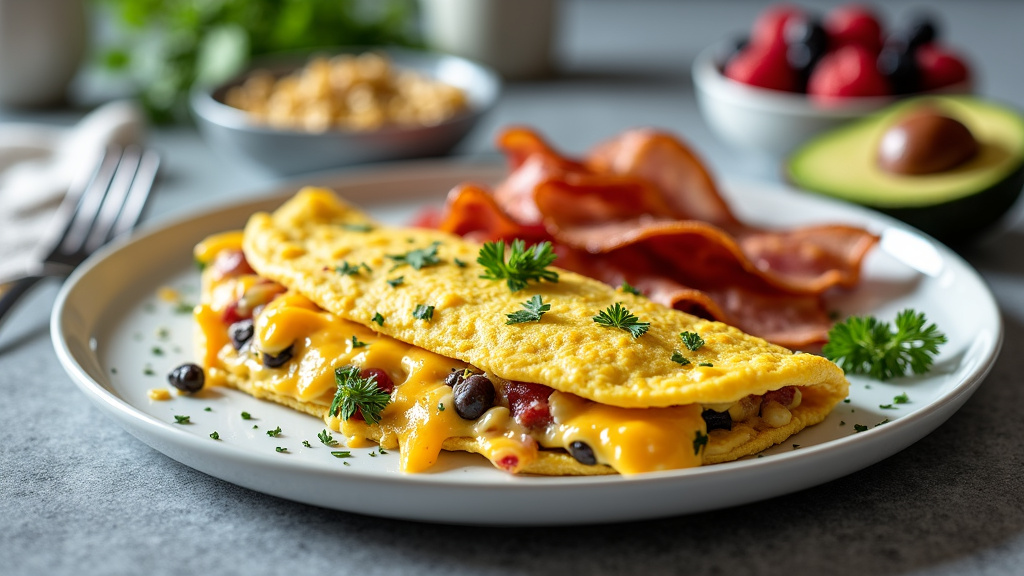
Starting a keto breakfast routine can feel overwhelming at first. Trust me, I’ve been there – staring longingly at that office donut box while clutching my black coffee.
Let’s address these breakfast challenges with practical solutions that’ll keep you firmly on your keto path. Whether you’re dealing with morning carb cravings or struggling to find quick options, I’ve got your back.
The good news? Research shows that once you adapt to a ketogenic morning routine, your energy levels and focus can improve dramatically. According to Men’s Health, success comes from maintaining a proper balance of fats and proteins while keeping carbs ultra-low.
Conquering Morning Carb Cravings
Those bagel and cereal cravings can hit hard, especially during the first few weeks. The key is satisfying your hunger with rich, filling alternatives that don’t spike your blood sugar.
Try starting your day with a protein-rich breakfast like scrambled eggs with cheddar cheese and half an avocado. This combination provides lasting satiety while keeping you in ketosis.
Prepare keto-friendly alternatives to your favorite breakfast foods. For example, use almond flour to make low-carb pancakes or create a breakfast bowl with cauliflower rice instead of oatmeal.
Keep convenient keto snacks readily available for those mornings when cravings strike particularly hard. Think pre-cooked bacon, hard-boiled eggs, or portion-controlled nuts.
Remember that cravings typically diminish significantly after the first few weeks as your body adapts to using fat for fuel instead of carbs.
Mastering Quick and Easy Meal Prep
Time constraints often push men toward grabbing convenient but carb-heavy breakfast options. The solution lies in strategic meal preparation.
Dedicate an hour on weekends to prep breakfast components like chopped vegetables, cooked meats, and portioned cheese. This makes morning assembly quick and stress-free.
Create make-ahead breakfast options like keto egg muffins or chia seed pudding that can last several days in the fridge. This ensures you always have a compliant option ready.
Consider preparing larger batches of keto-friendly breakfast foods and freezing individual portions for easy reheating. This strategy is particularly helpful for busy weekday mornings.
Navigating Social Breakfast Situations
Business meetings over breakfast or weekend brunches with friends can present unique challenges for maintaining your keto lifestyle.
Research restaurant menus in advance and identify keto-friendly options like omelets, bunless breakfast sandwiches, or meat and cheese plates. Most establishments are happy to accommodate special requests.
Don’t be afraid to communicate your dietary needs. Most people respect health-conscious choices, and being upfront can help avoid awkward situations.
Consider eating a small keto breakfast before social events if you’re unsure about available options. This takes the pressure off and allows you to focus on the social aspect rather than food choices.
Adding Variety to Avoid Breakfast Burnout
Eating the same foods every morning can lead to diet fatigue and increase the temptation to stray from your keto goals.
Experiment with different cooking methods for standard keto breakfast foods. For instance, try your eggs scrambled, poached, or in a frittata to keep things interesting.
Incorporate seasonal low-carb vegetables into your breakfast routine. This not only adds variety but also ensures you’re getting a wide range of nutrients.
Don’t forget about international cuisine for inspiration. Many traditional breakfast dishes can be adapted to fit keto requirements with simple substitutions.
Mastering Your Keto Breakfast Routine
A well-crafted keto breakfast routine forms the cornerstone of a successful ketogenic lifestyle for men. By prioritizing nutrient-dense proteins like eggs and fatty meats, incorporating healthy fats through avocados and nuts, and selecting low-carb vegetables, you can create satisfying morning meals that align with your fitness goals.
Mastering your keto breakfast starts with understanding the fundamental macronutrient balance: 70-75% healthy fats, 20-25% protein, and 5-10% carbohydrates. This precise ratio maintains ketosis and provides sustained energy throughout your morning.
According to research from the Men’s Health nutrition experts, personalizing your breakfast choices based on your activity level and schedule is crucial for long-term success. Some men thrive on intermittent fasting with a later breakfast, while others need substantial morning fuel for intense workouts.
Strategic meal preparation ensures consistency. Planning your weekly breakfast menu and prepping ingredients eliminates decision fatigue and keeps you aligned with your keto goals. Whether you prefer savory egg dishes or keto-friendly pancakes, having options ready sets you up for success.
Remember that finding your ideal keto breakfast routine requires patience and experimentation. Pay attention to how different meal combinations affect your energy, mental clarity, and satiety. The perfect morning menu is one that works best for your unique body and lifestyle while supporting your health and performance goals.



